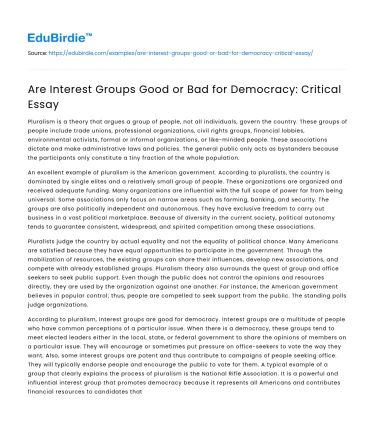Pluralism is a theory that argues a group of people, not all individuals, govern the country. These groups of people include trade unions, professional organizations, civil rights groups, financial lobbies, environmental activists, formal or informal organizations, or like-minded people. These associations dictate and make administrative laws and policies. The general public only acts as bystanders because the participants only constitute a tiny fraction of the whole population.
An excellent example of pluralism is the American government. According to pluralists, the country is dominated by single elites and a relatively small group of people. These organizations are organized and received adequate funding. Many organizations are influential with the full scope of power far from being universal. Some associations only focus on narrow areas such as farming, banking, and security. The groups are also politically independent and autonomous. They have exclusive freedom to carry out business in a vast political marketplace. Because of diversity in the current society, political autonomy tends to guarantee consistent, widespread, and spirited competition among these associations.
Save your time!
We can take care of your essay
- Proper editing and formatting
- Free revision, title page, and bibliography
- Flexible prices and money-back guarantee
Pluralists judge the country by actual equality and not the equality of political chance. Many Americans are satisfied because they have equal opportunities to participate in the government. Through the mobilization of resources, the existing groups can share their influences, develop new associations, and compete with already established groups. Pluralism theory also surrounds the quest of group and office seekers to seek public support. Even though the public does not control the opinions and resources directly, they are used by the organization against one another. For instance, the American government believes in popular control; thus, people are compelled to seek support from the public. The standing polls judge organizations.
According to pluralism, interest groups are good for democracy. Interest groups are a multitude of people who have common perceptions of a particular issue. When there is a democracy, these groups tend to meet elected leaders either in the local, state, or federal government to share the opinions of members on a particular issue. They will encourage or sometimes put pressure on office-seekers to vote the way they want. Also, some interest groups are potent and thus contribute to campaigns of people seeking office. They will typically endorse people and encourage the public to vote for them. A typical example of a group that clearly explains the process of pluralism is the National Rifle Association. It is a powerful and influential interest group that promotes democracy because it represents all Americans and contributes financial resources to candidates that are closely contesting.
Did you like this example?
Make sure you submit a unique essay
Our writers will provide you with an essay sample written from scratch: any topic, any deadline, any instructions.
Cite this paper
-
APA
-
MLA
-
Harvard
-
Vancouver
Are Interest Groups Good or Bad for Democracy: Critical Essay.
(2023, July 20). Edubirdie. Retrieved December 21, 2024, from https://edubirdie.com/examples/are-interest-groups-good-or-bad-for-democracy-critical-essay/
“Are Interest Groups Good or Bad for Democracy: Critical Essay.” Edubirdie, 20 Jul. 2023, edubirdie.com/examples/are-interest-groups-good-or-bad-for-democracy-critical-essay/
Are Interest Groups Good or Bad for Democracy: Critical Essay. [online].
Available at: <https://edubirdie.com/examples/are-interest-groups-good-or-bad-for-democracy-critical-essay/> [Accessed 21 Dec. 2024].
Are Interest Groups Good or Bad for Democracy: Critical Essay [Internet]. Edubirdie.
2023 Jul 20 [cited 2024 Dec 21].
Available from: https://edubirdie.com/examples/are-interest-groups-good-or-bad-for-democracy-critical-essay/
copy






 Stuck on your essay?
Stuck on your essay?

